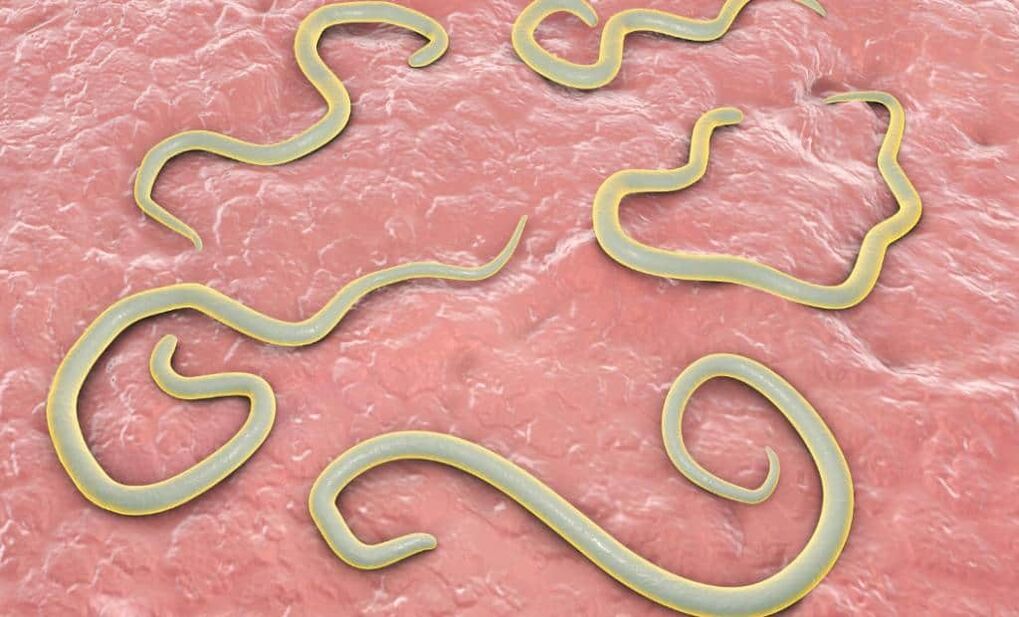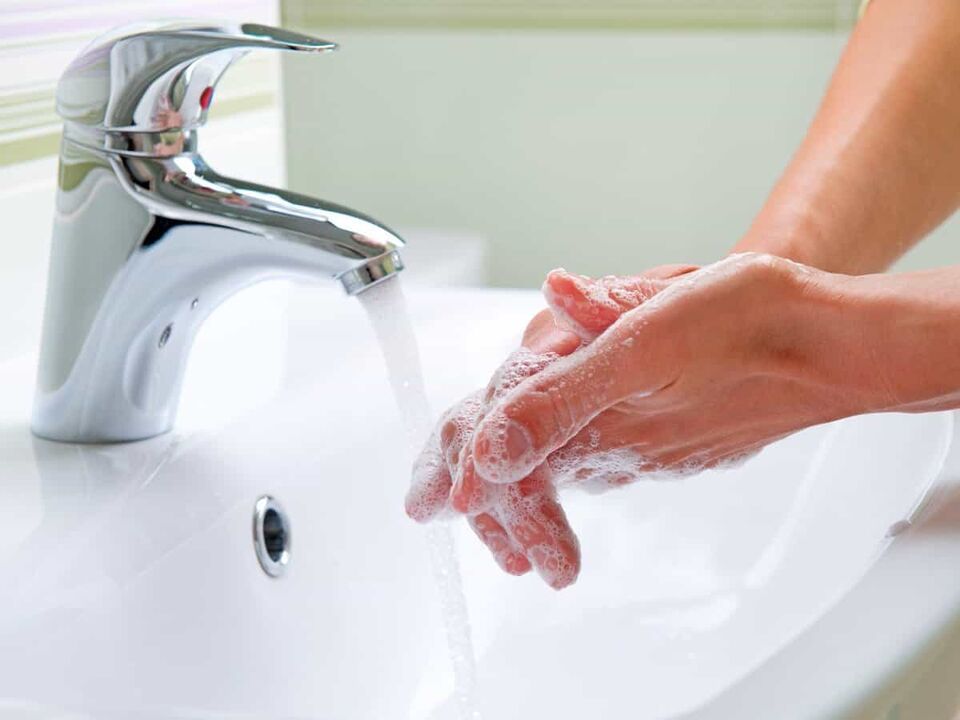Helminth preventionconsists in adhering to strict hygiene rules. Many of us don’t even realize we are infected with many parasites. Fatigue, apathy, headaches and indigestion are most often attributed to overwork or food quality. And few people think that these symptoms may indicate a parasite infection.
The worst thing is that helminthiasis hides and slowly impairs our health. The risk group includes children, whose bodies are often helpless against parasites. Therefore, it is very important to prevent the appearance of worms in a natural way, with the help of immunity.
Helminths and damage to the body
Worm infestation in humans can be caused by more than 400 species of parasitic worms. Infection often occurs through contaminated food and water, less often helminths penetrate the body through the skin.

Depending on the routes of infection, parasites are divided into 3 groups:
- biohelminths- through food (echinococcus, beef and swine tapeworm);
- geohelminth- with hands contaminated with feces, household items, sometimes with water (whip, hookworm, roundworm);
- contact worms- in personal contact with an infected person, less often in self-infection (pinworms, dwarf tapeworm).
According to body structure, parasites are divided into the following types:
- round (nematodes);
- tape (cestode);
- flukes (have strong suckers and a flat body).
The risk group includes children attending preschool institutions, agricultural workers, patients with immunodeficiency, the elderly and the elderly. Pets can also pose a risk of infection.
In adults, helminthiasis often occurs latently, has a long course, and manifests itself in various clinical signs that are disguised as another pathology. Children are characterized by an acute course with vivid symptoms, which is associated with the peculiarities of the immune system.
Helminths use the human body as a food source, habitat and reproduction. Instead, by releasing the products of their vital activity, worms cause systemic toxic damage to human organs and systems.
For example, hookworm larvae secrete an anticoagulant to maintain blood flow. It has been estimated that A. duodenale alone causes blood loss of 0. 2 ml per day. For the loss of 5 ml of blood, the presence of 25 pieces of helminths in the body is enough. But there are usually many more. As a result, the infected person has severe anemia.
According to numerous studies, helminthic invasions contribute to the more frequent development of somatic diseases, exacerbation of chronic pathologies, negatively affect the host body, including its immune system.
A characteristic of most helminthiasis is a chronic course associated with the long-term presence of pathogens in the body and recurrent recurrent infections. Helminthiasis in children is often accompanied by various non-specific symptoms: weakness, fatigue, irritability, sleep disorders, dyspepsia, growth retardation and weight gain, and decreased immunity.
Diseases caused by helminths reduce work ability and worsen the quality of life.
The role of immunity against helminths
The immune system is on the lookout for our health. Protects the body from viruses, bacteria and parasites. Unfortunately, immunity with the latter copes a little worse. This is especially true for children. The child's defenses are not sufficiently developed, and helminthic invasions further undermine the body's resistance to infections. This is why the prevention of helminths in children is so important.

Antiparasitic immunity is similar to antibacterial immunity. Both cellular and humoral bonds are involved in helminth protection. The first barrier for intruders is the skin and mucous membranes. More often, worms enter the body through the digestive tract. The mucous membrane of the stomach and intestines contains immune cells that trigger a series of reactions to repel parasites and remove them from the body.
The problem is that helminths have their own defense mechanisms, which often allow them to easily cross the first barrier.
Immunity against helminths is divided into primary and secondary. Since the primary person is born, he is a genetically determined defense factor. Secondary is formed during life after infection and the production of specific antibodies against a certain type of parasite.
The recently discovered TSLP (Thymus Stromal Lymphopoietin) has aroused great interest among scientists. Due to its unique properties, the cytokine plays an important role in protecting the body from worms. Depending on the nature of the infection, TSLP may potentiate or suppress the defense responses that regulate the two types of T lymphocytes.
The probability of infection largely depends on innate immunity and the health of the immune system as a whole, the effectiveness of which is always individual and depends on the type of worm.
The good functioning of the immune system depends on our diet, if the body lacks the necessary vitamins and minerals to build immune cells, then the response to infections will be weak and the fight will end in defeat.
Immunity needs biologically active substances that come with food. In case of chronic stress or illness, it is necessary to support the immune system with vitamins and microelements, because the organism uses all the nutrients to strengthen the nervous system, as well as medicinal herbs. And only in extreme cases resort to drug treatment.
How does worm immunity work?
Primary immunity against helminths can work in several ways:
- The parasite adapts to the internal environment of the host organism, grows well, develops and reproduces. The immune response is minimal. In such cases, helminthiasis is long-lasting, sometimes severe. An example is the dwarf tapeworm invasion.
- There appears to be a moderate immune response to helminth introduction. This limits the fertility of the worms. For example, a roundworm.
- The defensive reaction is well expressed, which blocks the complete development of the parasite. The worm does not reach sexual maturity, but can be harmful to health. The disease is short-lived or takes a latent course.
- Effective primary immunity stops the entry of parasites in the skin and mucous membrane phase. As a result, helminths do not penetrate internal organs and do not harm health.
Secondary immunity helps the body respond more quickly and efficiently to repeated helminthic invasions. This blocks the development of worms in the first stage of infection and reduces toxic effects. The protective reaction is based on the presence in the blood of antibodies (immunoglobulins) to this type of helminth.
The main links of the immune defense against parasite invasion:
- reaction of tissues of internal organs, which leads to isolation (capsule formation) and destruction of worms;
- production of class A and E immunoglobulins;
- changes in hormonal activity, especially on the side of estrogen, which are found in both the female and male body;
- hereditary factor (antiparasitic primary immunity).
An indicator of infection is a high content of eosinophils in the blood, which indicates an allergic reaction. Another important point is the sharp increase in the concentration of immunoglobulin E, provided there is no intolerance to food.
Important prevention rules
Immunity is dealt with by the introduction of parasites in different ways, not always effectively enough. Our task is to help the body prevent the threat of an alien invasion. Preventive measures must be respected at all times and without exception.
Parents should teach their children the rules of personal hygiene from an early age in order to minimize the risk of infection.
Preventive measures are simple and accessible to everyone, and at the same time they allow you to completely (or almost completely) exclude the danger of helminthic invasion. Nevertheless, physicians recommend that at-risk groups undergo additional drug prophylaxis, even if all necessary measures are taken. Medications are also taken as directed by a doctor if an infection is suspected or worms are detected during diagnosis.
Rules for the prevention of helminthiasis:
- Buy meat and fish products in certain locations. Vendors must have a quality certificate and a health certificate.
- Cook enough food. Follow the rules of salting, canning and pickling.
- Drink boiled tap water or filtered water.
- Before use, wash vegetables and fruits under running water. The greens can be washed first in soapy water and then in clean water. Strawberries are soaked in a 1% soda solution. After the berries are well washed with running water. Vegetables that are heavily contaminated with fertilizers are recommended to first soak in a weak solution of iodine (not more than 0, 3%).
- Follow the rules of personal hygiene. Wash hands with soap and water after using the toilet, outdoors, working in the yard, after any contact with animals, including pets.
- Regularly clean the area with disinfectants, especially bathrooms and kitchens.
- Clean pets of worms according to the veterinarian's schedule (usually 1-2 times a year).
- With enterobiasis, pay special attention to hand and nail hygiene, follow the child at night and in the morning, change underwear and bedding every time, which have been previously ironed. This prevents re-self-infection.
- It is important to lead a healthy lifestyle in order to strengthen and maintain your immune system. A rational diet, regular physical activity, the right response to stress and the rejection of bad habits will reduce the risk of parasite infection.
- Hemoprophylaxis 1-2 times a year according to the scheme prescribed by the doctor.

Worm medicines are taken in tablet form.This is chemoprophylaxis aimed at destroying parasites that may have entered the body but did not have time to cause a reaction of the internal organs.
They have an anthelmintic effectpumpkin seeds.Before eating the seeds can be chopped and mixed with a little honey. The daily dose for adults is 300 grams, for children, depending on age. Up to 4 years - 80 grams, up to 7 years - 100 grams, up to 10 years - 150 grams, up to 15 years - 200 grams. After 3 hours a laxative is taken.
Prevention of helminthiasis consists in strengthening the immune system, respecting the rules of personal hygiene and culinary processing of products. By following simple rules, we can protect ourselves from worm infection. Annual chemoprophylaxis helps our immune system cope with foreign attacks.
Talk to your doctor before taking an anthelmintic. The specialist will choose the medicine that suits you and give recommendations on the treatment regimen. Uncontrolled intake can not only be useless, but can also harm your health. Don't forget this.
An excellent alternative to tablets is worm herbs.



























